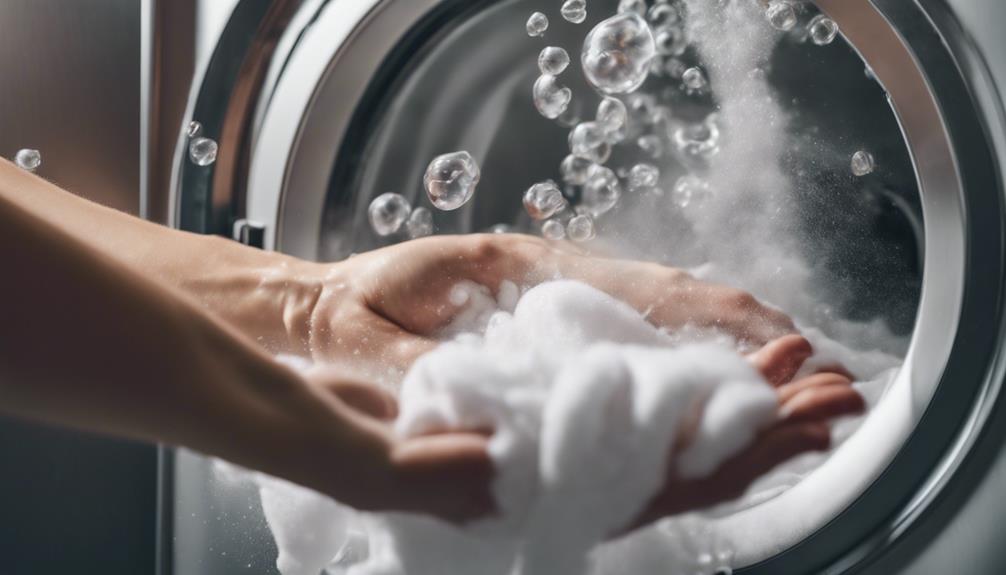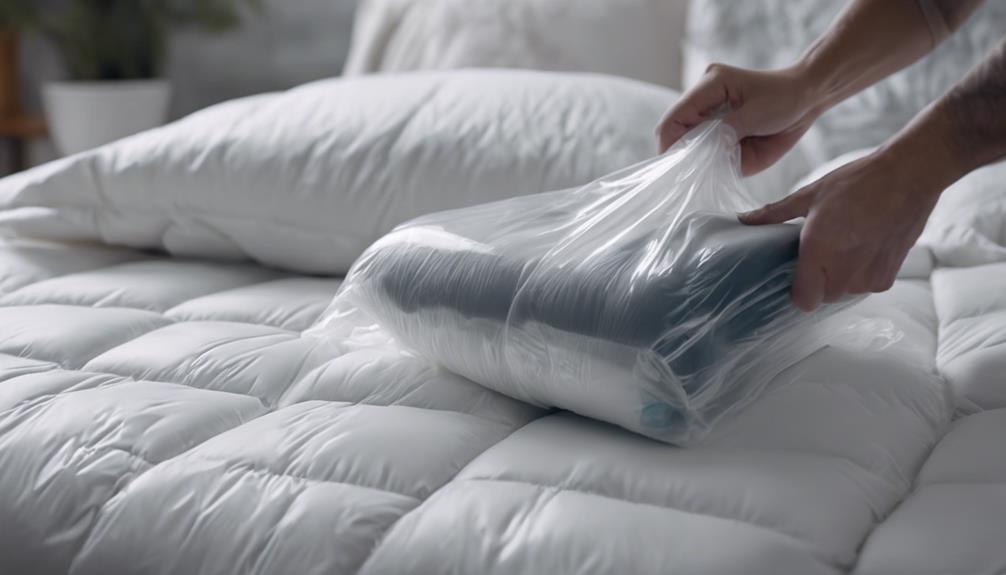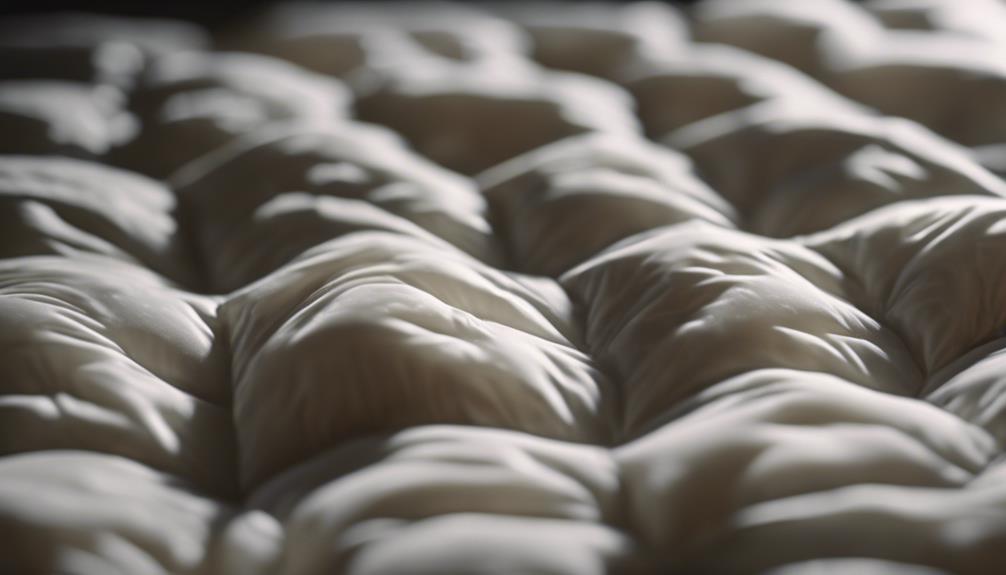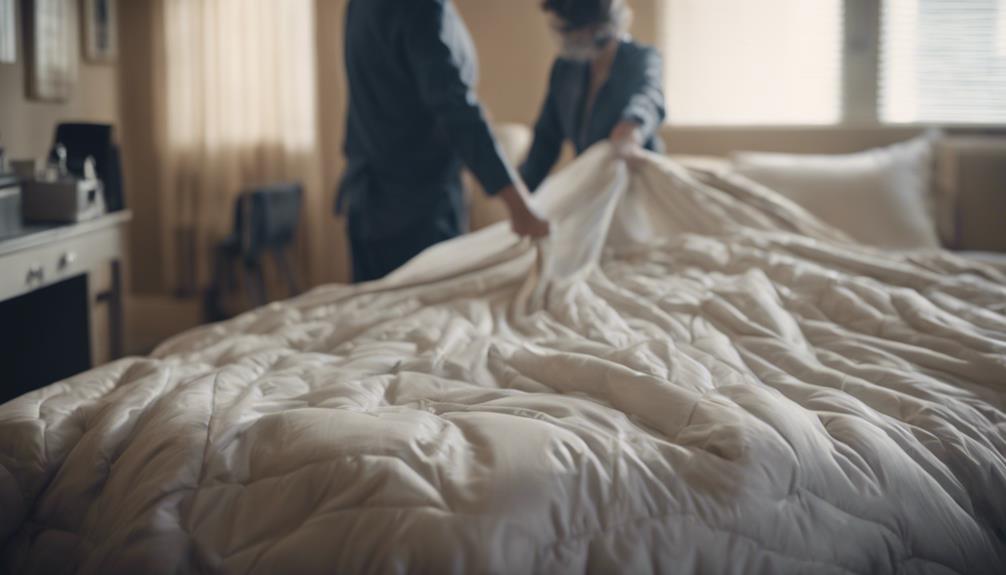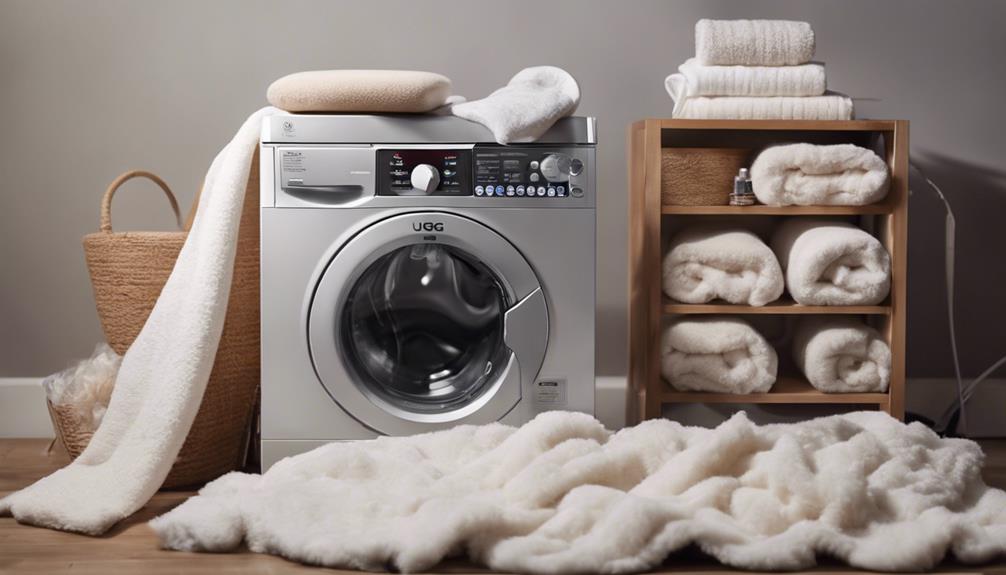When down comforters are washed, they may develop an unpleasant smell due to leftover chemicals, natural oils in feathers, environmental conditions, and manufacturing methods. Disinfectants may leave behind residues that produce foul odors when exposed to water, but thorough rinsing and proper ventilation can help alleviate this issue. The natural oils in feathers can also create distinctive scents after washing, but adding white vinegar to the wash can help neutralize these odors. In addition, high humidity and inadequate ventilation can contribute to musty smells, emphasizing the importance of thorough drying. The quality of the down material and manufacturing techniques used can also impact the post-wash smell. Understanding these factors is key to effectively managing odors in down comforters.
Key Takeaways
- Chemical residue from disinfecting agents causes lingering odors.
- Natural oils and proteins in feathers emit distinct post-wash smells.
- High humidity levels and lack of ventilation enhance musty odors.
- Quality of down material and manufacturing processes influence odor development.
- Proper drying techniques and fabric coverings help manage down comforter odors.
Chemical Residue From Disinfecting Agents
When washing down comforters, the lingering chemical residue from disinfecting agents used in manufacturing can often be the culprit behind unpleasant odors. These residual chemicals can emit odors when the comforter comes in contact with water during washing.
The disinfecting process may leave behind a scent that becomes more noticeable when the comforter is wet. To tackle this issue, proper rinsing and airing out are essential to help reduce the impact of chemical residue odors in down comforters.
Selecting down comforters from manufacturers that use minimal or natural disinfecting agents can also play a significant role in minimizing odor issues during washing. By being mindful of the chemicals used in the manufacturing process, one can enjoy a fresher-smelling comforter without the unwanted scent of chemical residue lingering after each wash.
Natural Odors From Feather Material
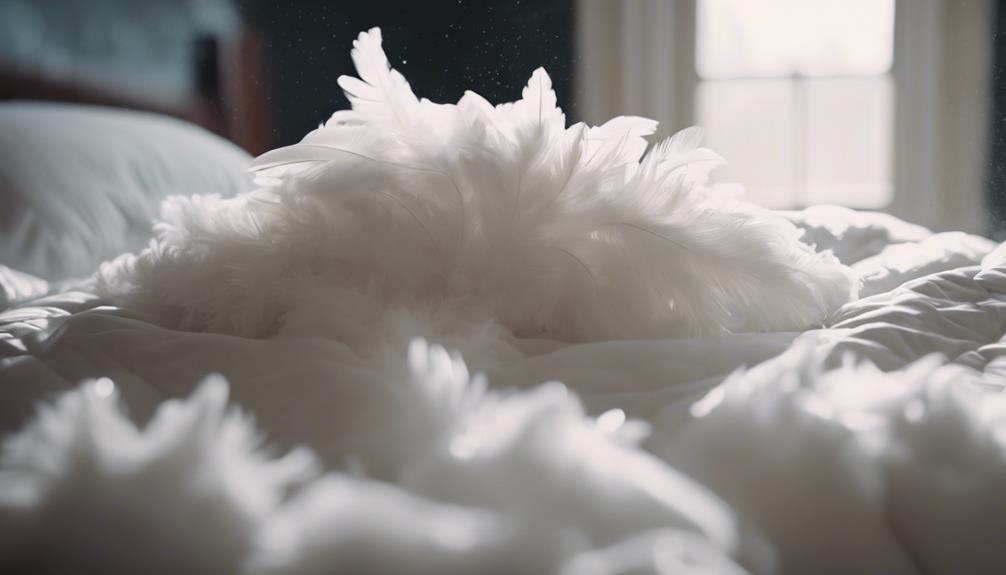
Feather material contains natural oils and proteins that emit a distinct odor when washed. This scent can become more noticeable when the feathers are damp.
Understanding the source of feather odor can help in minimizing its impact when washing down comforters.
Feather Scent Source
Taking into account these natural odors, it's crucial to care for down comforters in order to preserve their freshness.
The natural scents emanating from the feather material in down comforters can contribute to the development of a distinct scent after washing. Feathers themselves are a significant feather scent source, releasing odors more prominently post-wash. These scents are a result of natural oils and substances present in the feathers.
When the comforter is washed, these odors become more noticeable as the water and detergent release them from the feathers. White vinegar, often used in washing down comforters, can help neutralize some of these odors.
Understanding the origin of these scents sheds light on why down comforters may have a unique smell after being laundered. It's crucial to acknowledge these natural odors when caring for down comforters to maintain their freshness.
Minimizing Odor Impact
After washing down comforters, managing the impact of natural odors from the feather material becomes essential to preserving their freshness. The natural oils in down feathers can create a distinct odor when washed, sometimes intensified by the feather material itself. Proper ventilation and thorough drying are key in minimizing these odors.
Some may find the scent pleasant, reminiscent of the outdoors. Understanding these natural odor properties can help in setting expectations during the washing process. By allowing for adequate airflow and ensuring complete drying, the impact of these natural odors can be minimized, preserving the overall freshness of the down comforter.
Influence of Environmental Conditions
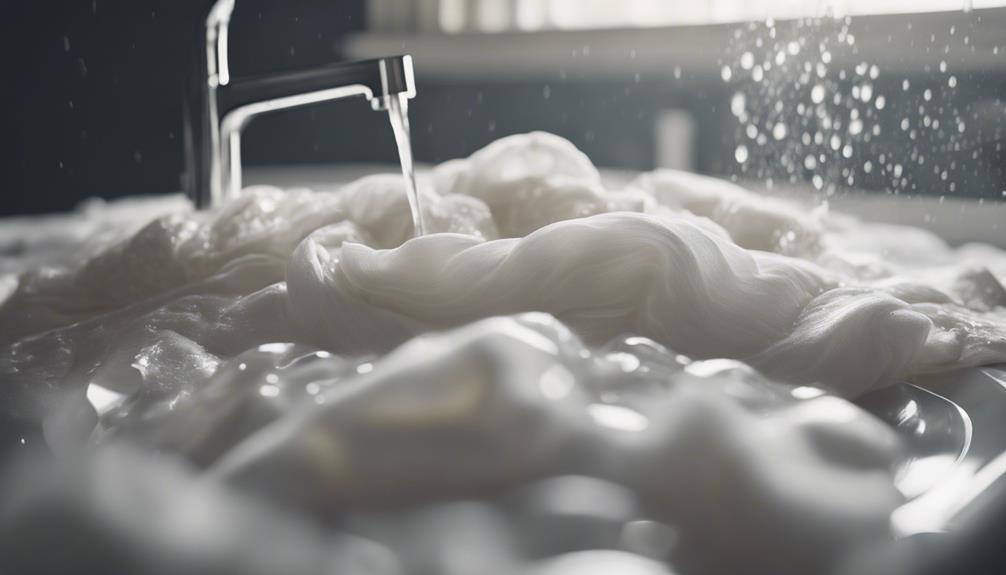
When considering the influence of environmental conditions on the development of odors in washed down comforters, one must factor in the impact of humidity levels.
- High humidity levels can cause down comforters to absorb moisture, leading to musty odors.
- Lack of proper ventilation during drying can trap odors and moisture in down comforters.
- Exposure to moist conditions during washing and drying processes can enhance the development of odors.
- Storing down comforters in damp or enclosed spaces post-washing can worsen any existing odors.
Environmental factors play an important role in the odor development of down comforters. To minimize odors, it's vital to maintain proper care during washing and drying, especially in areas with high humidity. Adequate ventilation and avoiding damp storage areas can help maintain the freshness of down comforters. By understanding the influence of environmental conditions, one can take proactive steps to keep down comforters smelling clean and pleasant.
Quality of Down Material
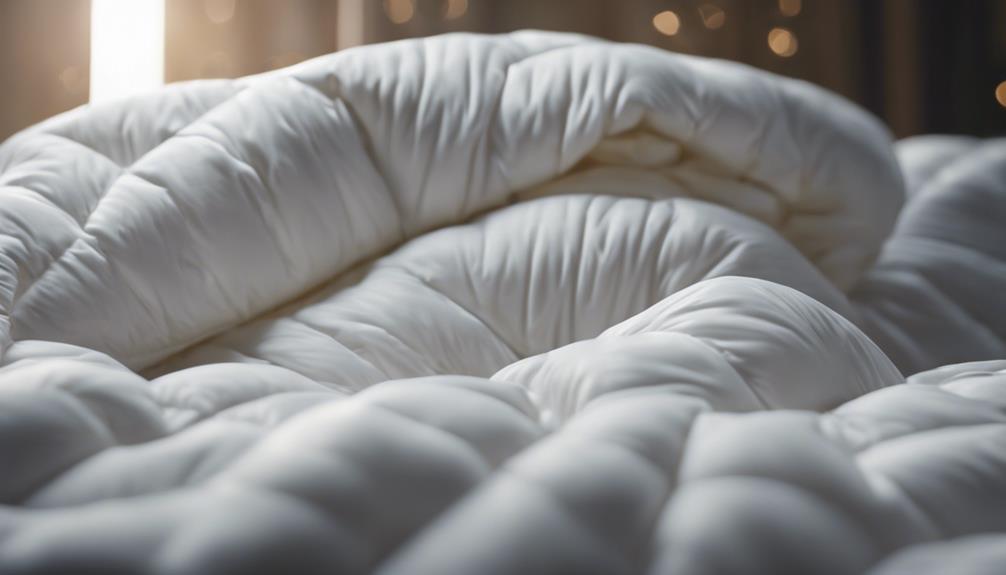
The source of the down material, the methods used in processing it, and the treatments applied can have a considerable impact on the smell of a comforter after washing. Higher quality down, sourced from reputable suppliers and treated to be odor-resistant, is less likely to retain unwanted scents.
When choosing a down comforter, considering the quality of the down material can help avoid post-wash odors.
Down Material Source
Quality of down material greatly influences the occurrence of odors in washed comforters. When the down is sourced from reputable suppliers with higher standards, it tends to retain less moisture, resulting in a reduced risk of a moldy smell after washing.
On the other hand, lower quality down material may trap more moisture, leading to a musty odor post-washing. Understanding the source of the down material is essential in managing and preventing unpleasant smells in comforters.
To help alleviate odors, it's advisable to air dry the comforter thoroughly after washing. By investing in quality down material, you can minimize the chances of encountering persistent odors in your comforter.
Down Processing Methods
After exploring the impact of down material source on comforter odors, our focus now shifts to the significance of down processing methods in determining the quality and natural smell of down comforters.
The processing method of down feathers plays an important role in how a down comforter smells after washing. Different processing techniques can lead to varying levels of natural odor in comforters. High-quality processing methods have the potential to reduce the inherent smell of down in comforters.
Down sourced from reputable suppliers and processed using advanced techniques may exhibit minimal odor. Understanding these processing methods is essential for selecting a down comforter with reduced odor, making the post-wash experience more pleasant for users.
Down Material Treatment
Selecting the appropriate treatment for down material significantly impacts the odor-resistance and overall freshness of comforters after washing.
- Opt for high-quality down material treated to resist odors during the wash cycle.
- Lower quality down materials may lack proper treatment, resulting in unpleasant smells post-wash.
- Quality down material treatments can enhance the overall freshness of the comforter.
- Make sure to wash the comforter at low heat to preserve the effectiveness of the odor-resistant treatment.
Impact of Manufacturing Processes
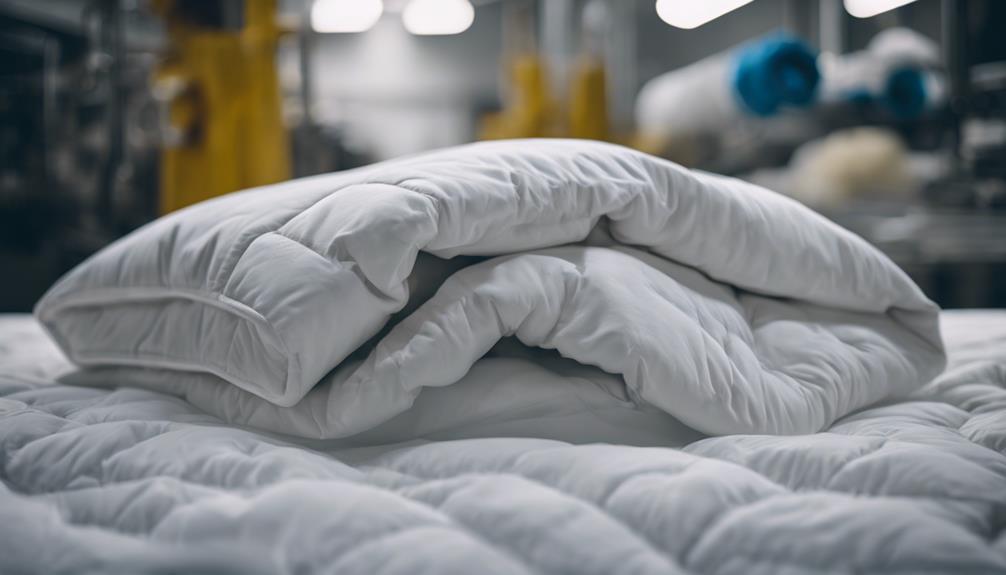
During the manufacturing processes of down comforters, certain chemicals can contribute to the lingering smell experienced when washed. The chemicals used in treating the down material and in the manufacturing of the comforters can play a significant role in how they smell after being washed. Factors like the quality of the down material, the manufacturing location, and even environmental conditions during storage and shipping can also influence the odor that lingers post-washing.
Additionally, natural odors from the feathers in the down comforters may become more noticeable after the washing process. It's important to take into account that manufacturing standards and regulations in different regions can impact the smell of down comforters when washed. By understanding the various elements involved in the manufacturing processes, we can better comprehend why down comforters may have a distinct smell after being washed.
Fabric Covering Absorption
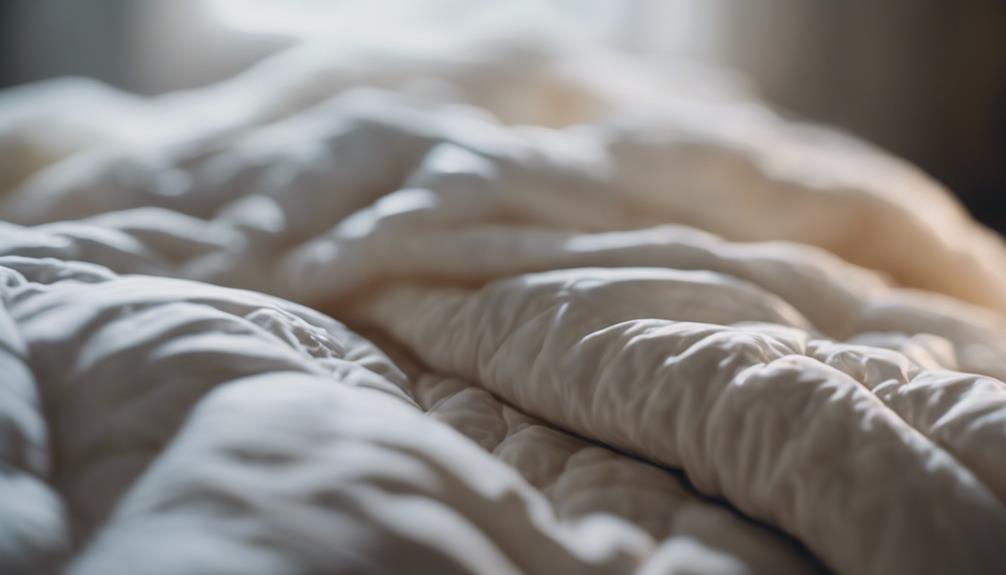
The fabric covering of down comforters plays an important role in absorbing odors from the environment during washing. Different types of fabric coverings may retain odors differently, affecting the overall smell of the comforter.
To address this issue effectively, consider the following:
- Choose Quality Fabrics: Opt for high-quality, odor-resistant fabric coverings to minimize the impact of absorbed odors.
- Proper Cleaning Methods: Employ appropriate cleaning methods to help reduce the absorption of odors.
- Dry Cleaners: Utilize dry cleaners if necessary, as they can assist in thoroughly cleaning the comforter without saturating it with moisture.
- Thoroughly Dry: Make sure that the comforter is completely dry after washing to prevent any lingering odors from developing.
Washing Methods and Effectiveness
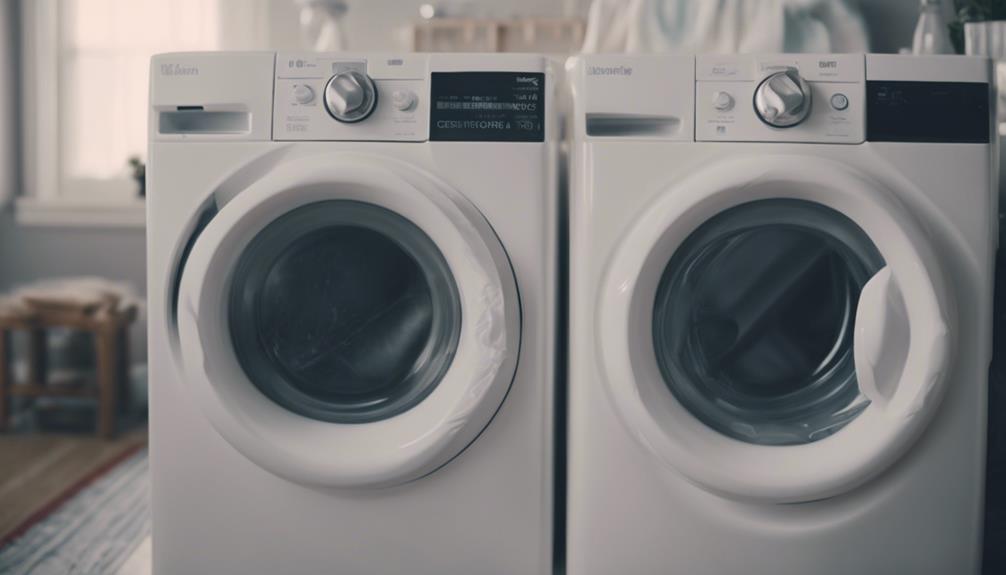
When washing down comforters, ensuring thorough drying is essential to prevent the development of unpleasant odors. To effectively clean your down comforter, start by washing it in warm water with a mild detergent. After washing, make sure to dry the comforter completely to prevent any lingering smells. Consider using a large commercial dryer or air drying in the sun for best results.
In some cases, adding vinegar to the wash cycle can help eliminate odors from the comforter. If odors persist, using bleach sparingly and airing out the comforter in the sun can also be effective in removing unwanted smells. By following these washing methods and ensuring proper drying techniques, you can keep your down comforter fresh and odor-free for a cozy night's sleep.
Frequently Asked Questions
How Do You Get the Smell Out of a Down Comforter?
To get the smell out of a down comforter, we recommend washing it with vinegar and detergent on a delicate setting. Adding tennis shoes in the wash can help eliminate mildew smells.
After washing, dry the comforter on low heat with a few big bath towels. For fluffiness, toss in tennis balls or sneakers during the final drying cycle.
Avoid fabric softeners and consider air drying outside for freshness.
Does a Down Comforter Stink When Wet?
When wet, down comforters can indeed develop a stink due to moisture retention, creating an ideal breeding ground for fungi. This trapped humidity fosters fungal growth, resulting in unwanted odors.
Proper drying methods and airing out the comforter thoroughly can help eliminate the musty smell caused by fungal spores thriving in moist conditions.
Regular maintenance and care after washing are important to prevent the development of unpleasant smells in down comforters.
Is It OK to Wash a Down Comforter in the Washing Machine?
Washing a down comforter in a large front-loading commercial-grade machine can be important, but home machines may be too small or gentle for the task.
It's vital to dry the comforter with non-chlorine bleach if needed and use a large commercial dryer on medium heat to prevent damage.
Periodically checking the comforter during drying helps avoid overheating and guarantees thorough drying.
How to Stop Feather Duvet From Smelling?
To prevent feather duvets from smelling, guarantee thorough drying post-wash. Adding fungicide during washing can eliminate odors from fungal spores.
Store duvets in breathable cotton bags to prevent moisture retention. If smells persist, rewash and dry completely.
Seeking professional advice or re-cleaning services may be necessary for stubborn odors. Remember, proper drying and storage are key to keeping your duvet fresh and odor-free.
What Causes the Smell of Down Comforters When Washed?
When washing down comforters, the smell that may arise is due to moisture becoming trapped within the filling, leading to potential mildew growth. Additionally, the use of improper cleaning agents or the lack of thorough drying can also contribute to down comforters smell issues.
Conclusion
To sum up, down comforters may smell after washing due to:
- Chemical residue
- Natural odors
- Environmental factors
- Down quality
- Manufacturing processes
- Fabric absorption
Despite our best efforts, these odors can linger, reminding us that even the coziest of comforts require a little extra care. Remember to read labels, follow washing instructions, and air out your comforter for a fresh and fragrant sleep experience.
